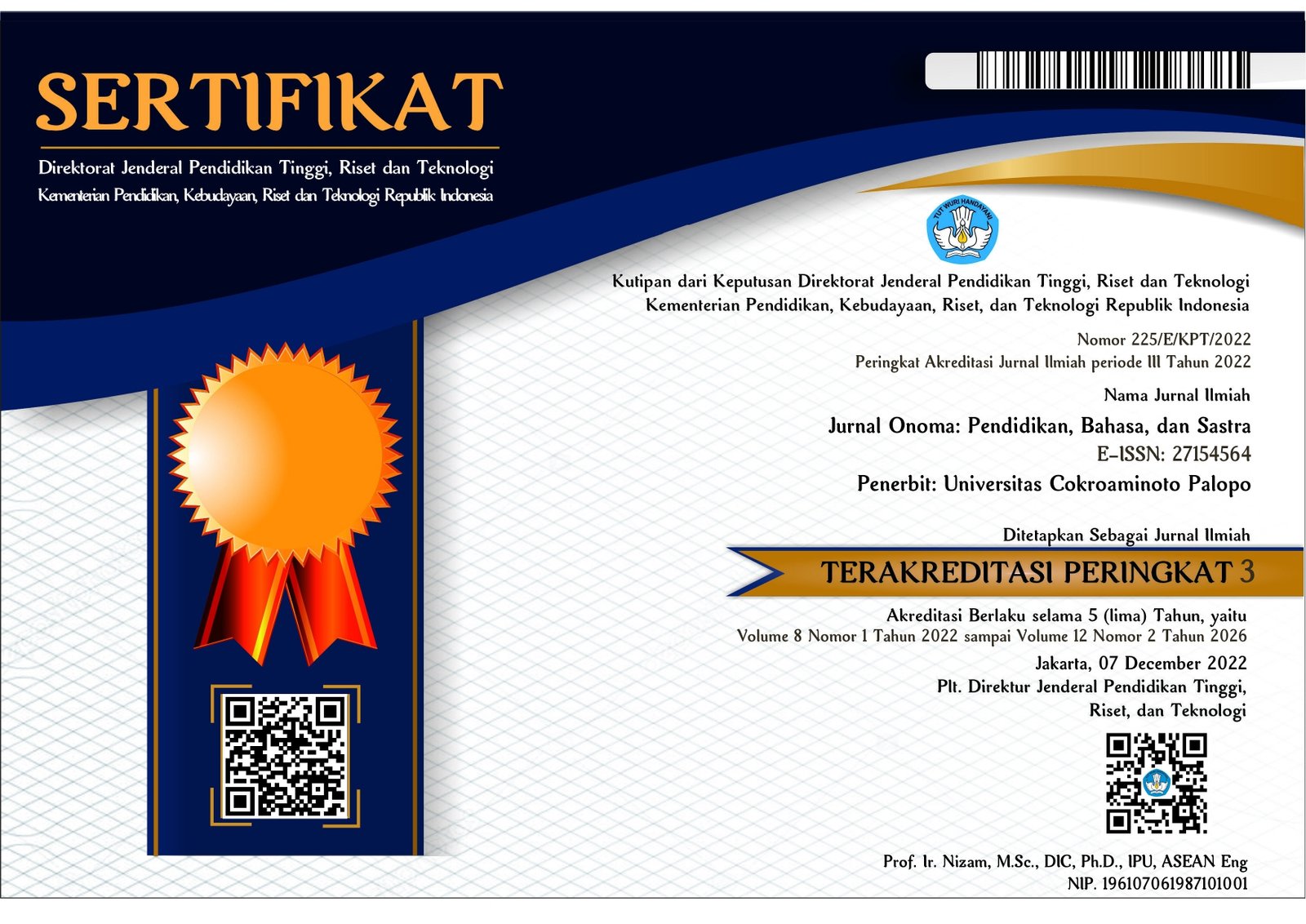Analisis Wacana Kritis Video Youtube Habib Main ke Kampung Bhante di Akun Jeda Nulis
https://doi.org/10.30605/onoma.v11i1.5200
Keywords:
Analisis Wacana Kritis, Jeda Nulis, YouTubeAbstract
Penelitian ini bertujuan untuk menjelaskan analisis teks wacana kritis dalam video “Habib Main ke Kampung Bhante” di akun YouTube Jeda Nulis, Kognisi sosial pemilik akun Jeda Nulis dan konteks sosial yang berkembang di masyarakat Wacana moderasi beragama masih hangat dibicarakan dikalangan masyarakat Indonesia yang mempunyai beragam suku, bahasa agama dan budaya, dan banyak tokoh giat membicarakan tentang itu salah satunya Habib Ja’far. Peneliti menggunakan metode kualitatif untuk memperoleh data, kemudian melakukan pengumpulan data melalui observasi dan dokumentasi, selanjutnya data tersebut dianalisis menggunakan analisis wacana kritis Teun A. Van Dijk. Hasil penelitian sebagai berikut. Pertama, dalam analisis teks, tema teks adalah Habib Main ke Kampung Bhante. Kedua, analisis kognisi sosial yang mempengaruhi, yaitu nilai moderasi yang dipegang erat sebagai ideologi dan pengalaman dalam menyebarkan nilai-nilai moderasi dikalangan anak muda. Ketiga, analisis konteks sosial meliputi dua faktor, yaitu praktik kekuasaan dan akses yang mempengaruhi wacana yang ditimbulkan karena pengaruh Habib Ja’far dan Bhante dira atas kecakapannya dalam hal moderasi beragama.
Downloads
References
Afandi, Y. (2023). Kolaborasi, Kreatifitas Dan Keamanusiaan: Aktivitas Dakwah Habib Jafar Di Youtube. Jurnal Kajian Komunikasi Dan Penyiaran Islam, 5, 30–44. https://doi.org/https://doi.org/10.47435/retorika.v5i2.2200. DOI: https://doi.org/10.47435/retorika.v5i2.2200
Bakri, B. F., Mahyudi, J., & Mahsun, M. (2020). Perempuan di Bidang Politik dalam Surat Kabar Lombok Post Tahun 2019: Analisis Wacana Kritis Perspektif Teun A. Van Dijk. LINGUA : Jurnal Bahasa, Sastra, Dan Pengajarannya, 17(1), 65–78. https://doi.org/10.30957/lingua.v17i1.625 DOI: https://doi.org/10.30957/lingua.v17i1.625
Basit, A. (2015). Wacana Dakwah Kontemporer. LKIS.
Faza, Mohammad Saiq Kamal, and A. A. M. (2023). Analisis Sentimen Penonton Pada Video Habib Ja’Far Melalui Aplikasi MAXQDA. Jurnal Komunikasi Dan … 7 (1): 1–12. Https://Journal.Ummat.Ac.Id/Index.Php/Jail/Article/View/19356%0Ahttps://Journal.u Mmat.Ac.Id/Index.Php/Jail/Article/Download/19356/7820.
Hayatd, A. (2023). Dampak Konten Podcast Deddy Corbuzier dalam Membuat Penonton Berpikir Kritis. Lugas: Jurnal Komunikasi, 7(1), 53–62. http://ojs.stiami.ac.id DOI: https://doi.org/10.31334/lugas.v7i1.3107
Https://backlinko.com/youtube-users. (n.d.). No Title. https://backlinko.com/youtube-users
https://id.wikipedia.org/wiki/Husein_Ja%27far_Al_Hadar. (n.d.).
Https://www.bps.go.id/id/statistics-table/2/MTk3NSMy/jumlah-penduduk-pertengahan-tahun--ribu-jiwa-.html. (n.d.). No Title. https://www.bps.go.id/id/statistics-table/2/MTk3NSMy/jumlah-penduduk-pertengahan-tahun--ribu-jiwa-.html
https://youtu.be/r5cABWow0ZE?si=8h_rxCw83Ep0VKig. (n.d.).
IIQ Jakarta Webinar Nasional Al Quran dan Moderasi Beragama, Habib Husein Ja’far Al Hadar. (2021). https://youtu.be/SmLN1hGqML0 DOI: https://doi.org/10.58404/uq.v1i2.75
Jayanti, K. D., & Pribadi, F. (2024). Wacana Berpendapat Rocky Gerung dalam Program Perempuan Bicara TvOne: Analisis Wacana Kritis Teun A Van Dijk (Vol. 13, Issue 1). https://www.youtube.com/watch?v=7xnA5OtjjnU.
Mailinda, Riska, D. (2023). Moderasi Beragama Kaum Milenial : Studi Pemikiran Habib Husein Ja ’ far Al -Hadar. 1(1).
Mailinda, R. (2023). Moderasi Beragama Kaum Milenial : Studi Pemikiran Habib Husein Ja ’ far Al -Hadar. The Ushuluddin International Student Conference, 1, 1.
Nihayatul Husna. (2023). Dakwah Digital Habib Ja’far Pada Generasi Z. Jurnal Selasar, 3, 1. DOI: https://doi.org/10.47467/elmujtama.v3i3.3081
Perrmana, R., & Yusmawati. (2023). Budaya Digital Da ’ i Milenial : Representasi Diri Habib Ja ’ far sebagai Tokoh Lintas Agama di Podcast “ Close The Door – Login .” INNOVATIVE: Journal of Social Science Research, 3(1), 513–525.
Riska Dwi Lestari. (2023). Sejarah Moderasi Beragama di Indonesia. SOCIAL PEDAGOGY: Journal of Social Science Education, 3(2), 289. https://e-journal.metrouniv.ac.id/index.php/social-pedagogy/article/view/5877 DOI: https://doi.org/10.32332/social-pedagogy.v3i2.5877
Sya’bani, M. H., Razzaq, A., & Hamandia, M. R. (2024). Analisis Pesan Dakwah pada Media Sosial Podcast Login Habib Ja’far dan Onad. Pubmedia Social Sciences and Humanities, 1(3), 15. https://doi.org/10.47134/pssh.v1i3.170 DOI: https://doi.org/10.47134/pssh.v1i3.170
Yanti, N. P. D. E., Putrayasa, I. B., & Artika, I. W. (2019). Analisis Wacana Kritis Teun A. Van Dijk Pada Teks Pidato Klaim Kemenangan Pilpres 2019. Jurnal Ilmiah Pendidikan Dan Pembelajaran, 3(3), 356–362. https://ejournal.undiksha.ac.id/index.php/JIPP/article/viewFile/21846/13519
Downloads
Published
How to Cite
License
In submitting the manuscript to the journal, the authors certify that:
- They are authorized by their co-authors to enter into these arrangements.
- The work described has not been formally published before, except in the form of an abstract or as part of a published lecture, review, thesis, or overlay journal.
- That it is not under consideration for publication elsewhere,
- That its publication has been approved by all the author(s) and by the responsible authorities – tacitly or explicitly – of the institutes where the work has been carried out.
- They secure the right to reproduce any material that has already been published or copyrighted elsewhere.
- They agree to the following license and copyright agreement.
License and Copyright Agreement
Authors who publish with Onoma Journal: Education, Languages??, and Literature agree to the following terms:
- Authors retain copyright and grant the journal right of first publication with the work simultaneously licensed under Creative Commons Attribution License (CC BY 4.0) that allows others to share the work with an acknowledgment of the work's authorship and initial publication in this journal.
- Authors are able to enter into separate, additional contractual arrangements for the non-exclusive distribution of the journal's published version of the work (e.g., post it to an institutional repository or publish it in a book), with an acknowledgment of its initial publication in this journal.
- Authors are permitted and encouraged to post their work online (e.g., in institutional repositories or on their website) prior to and during the submission process, as it can lead to productive exchanges, as well as earlier and greater citation of published work.

















